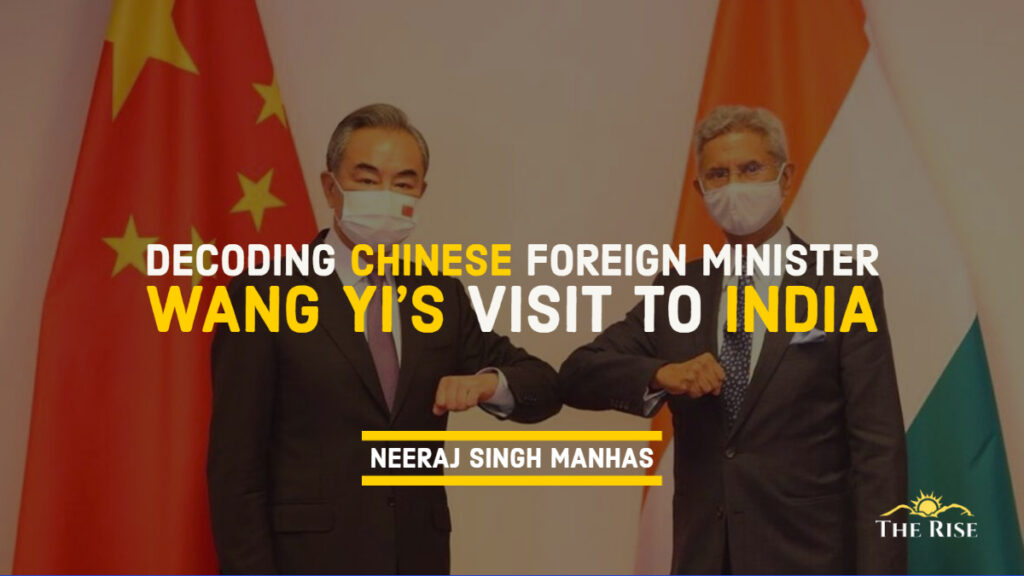The visit to India of Wang Yi, China’s foreign minister and State Councillor, which was kept secret until he arrived in New Delhi following visits to Pakistan and Afghanistan, had multiple objectives. China appeared to have attempted to advance its agenda in this region in light of the larger objective in the South China Sea, after assessing the geopolitical changes resulting from the Russia-Ukraine conflict. China’s broad objective was threefold:
- First, to expand its BRI in the region;
- Second, to exploit Afghanistan’s deteriorating economic situation by acquiring mining rights in areas with virtually no competition; and
- Third, to diplomatically push the Sino-Indian border issue to the back burner in order to formalize military gains and concentrate on acquiring Taiwan. Thus decoding Yi’s visit to India becomes relevant.
Wang Yi’s remarks in Pakistan at the OIC, indicating support for Pakistan’s position on J&K prior to his visit to India, could be interpreted as a diplomatic blunder. However, it was a deliberate statement intended to project India’s superiority in the region, and it was at this point that India diplomatically formalized China’s military gains along the border.
Also Read: Indian Ocean and South China Sea: Jugular Vein as Gordian Knot
Unfortunately for Wang, Indian National Security Advisor Ajit Doval and Foreign Minister Jaishankar made it abundantly clear to him that normal relations between the two countries are impossible until the border situation improves. Wang, as is customary in Chinese diplomacy, used subtly disguised concepts to argue that normalization of relations between the two countries should take precedence and that the border issue should be placed in an appropriate position—that is, given no weight.
Wang Yi used subtly disguised concepts to argue that normalization of relations between the two countries should take precedence and that the border issue should be placed in an appropriate position—that is, given no weight. However, the Indian side made it abundantly clear that improvement in border situation is a prerequisite for normalization of relations.
Wang proposed three concepts for the Sino-Indian relationship’s future development. To begin, both countries should take a “long-term view,” place the border issue in an “appropriate context,” and maintain the proper direction for bilateral relations development. Second, China and India should approach their relationship with a “win-win” mentality. This means that India accepts China’s current position and will cooperate with it for mutual benefit. This sentence echoes a statement made by a Chinese military spokesperson following the Galwan Valley clashes, in which he stated that India should be satisfied with the gains already made at the border – a surprising statement given China’s occupation of India’s territory. Third, both countries should adopt a cooperative attitude toward the multilateral processes. This was done to ensure that the Indian Prime Minister attends the next BRICS Summit, which will be hosted by China, and also to convince India to work in a Russia-China-India format, presumably under its leadership.
Also Read: The Achilles’ Heels of China in 2022
In the current environment, India’s approach to Russia may have given Wang hope of establishing a common front against the West, thereby weakening the Quad. China is unaware that India’s close ties with Russia are not solely due to India’s reliance on Russia for defence equipment or its support in the UN Security Council, but also because India recognizes Russia’s importance for Central Asia and uses Russia as a leverage against China. Additionally, India’s approach to Russia, even during the current conflict, is markedly different from China’s. The only point of agreement is on the urgent need for a ceasefire and a return to diplomacy and dialogue.
China is unaware that India’s close ties with Russia are not solely due to India’s reliance on Russia for defence equipment or its support in the UN Security Council, but also because India recognizes Russia’s importance for Central Asia and uses Russia as a leverage against China.
The Indian NSA and foreign minister, both, remained steadfast in their adherence to the well-known Indian position. Ajit Doval stated unequivocally that an immediate and complete disengagement and de-escalation were in everyone’s best interests. When Wang invited Doval to the next round of talks between the two countries’ Special Representatives, Doval reportedly stated that ‘he would visit China as soon as the immediate issues are resolved successfully.’
Also Read: China’s South China Sea Claims Threaten India’s Economic and Geopolitical Interests
Jaishankar responded to Wang’s suggestion that India and China resume normal relations by stating that the prerequisite was peace and tranquillity—a reference to previous border agreements that China has violated with impunity.
While other issues were discussed, no joint statement was issued. Wang was also unable to meet with Prime Minister Modi. Thus, from a bilateral standpoint, it was merely a photo op. However, Wang’s visit to this region may have a broader purpose. With the world’s attention now focused on the Ukraine-Russia conflict, China may be able to accomplish its goal of acquiring Taiwan. As Xi stated in his new year’s address, “the complete reunification of our motherland is a goal shared by people on both sides of the Taiwan Strait.” Historically, when the International Community’s attention was diverted elsewhere, it occupied features in the South China Sea. When the world was in flux following the collapse of the Soviet Union and countries were readjusting their relations, China seized and later militarised Mischief Island. Again, while the world’s attention was diverted to West Asian and Afghan issues, China occupied the Scarborough feature, constructing artificial islands and militarizing them.
Also Read: The Lessons for Taiwan from Russia-Ukraine Conflict
China is very likely to make audacious attempts to occupy Taiwan if the circumstances are favourable. China would prefer to avoid a crisis at the Sino-Indian border in order to accomplish this. Wang’s visit may have this as a primary objective. The United States and other countries must factor this possibility into their calculations and take appropriate precautions.
Disclaimer: The views expressed in this article are of the author solely. TheRise.co.in neither endorses nor is responsible for them.
About the author
Neeraj Singh Manhas is a Director of Research, Indo-Pacific Consortium, at Raisina House, New Delhi. He has authored four books under his name and has various research interests covering India-China in the Indian Ocean, India's maritime securities, and Indo-Pacific studies.















Pingback: Russia - Ukraine Conflict and Defence Sector: Implications for India